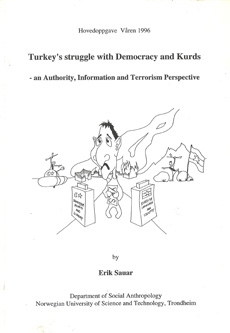
Turkey's struggle with Democracy and Kurds
Erik Sauar
Norwegian University
It is always a privilege to be a guest among Kurds and Turks. The way I have been received, and the confidence people have given me has been so overwhelming, that to describe it in a few lines is hardly possible. Unfortunately, due to the strict regulations in Norway on visas to citizens of Turkey and the cost of transport involved, I will probably never have the chance to serve my many hosts as they have served me. Considering this lack of opportunity for expressing my sincere gratitude, it is even more unfortunate that I can not even give them my symbolic gratitude here in the thesis. Due to security precautions, their names must remain absent.
Some institutions however, can still be thanked. During my fieldwork, The Norwegian Institute for Human Rights provided me with some interesting tasks related to the "Oslo Seminar on the Human Rights situation in areas inhabited by Kurdish groups" arranged in September 1995. This both helped financing my costs and gave me access to parts of the Turkish society which could otherwise have been closed. The Kurdish Institute of Paris ...
Contents
Chapter 1
Introduction / 5
1.1 Background / 5
1.1.1 Some definitions and concepts / 5
1.1.2 Former research / 8
1.1.3 Democracy, Human Rights and Cultural Imperialism / 11
1.2 Aim of thesis / 13
1.3 Methodology and Anthropology during "civil war" / 15
1.3.1 Understanding through an incomplete language / 15
1.3.2 My visits to Turkey / 16
1.3.3 Informants, friends and analysts / 19
1.3.4 Observations, reasoning, transparency and correctness / 19
1.4 A Turkish and Kurdish history / 20
1.4.1 The history of Turks and Turkey / 22
1.4.2 The history of Kurds and Kurdistan / 23
1.5 Writing histories - political motivation and social constraints. / 32
1.5.1 Textual differences, contradictions and agreements / 32
1.5.2 Political motivation / 33
1.5.3 The audience as social constraints and possibilities / 34
1.5.4 Mixing ideology, historical facts and parts of the present / 35
1.5.5 Disagreement on the disagreement / 35
1.5.6 A summary and a final comment / 36
Chapter 2
Authority and role models
in Turkish and Kurdish society / 37
2.1 Family, relatives and peers / 37
2.1.1 Traditional family life with focus on the father and son / 39
2.1.2 Peers and in determined relations / 46
2.1.3 Learning double-dealing and hypocrisy / 46
2.2 School and University life / 49
2.2.1 School / 49
2.2.2 University / 50
2.2.3 Barriers protecting the authority truths / 52
2.3 Authority versus democracy in adult life / 53
2.3.1 Primary and secondary socialization / 53
2.3.2 The structure of conversations / 55
2.3.3 All-knower's / 58
2.3.4 Critique minimization and Statement multiplication / 59
2.3.5 Adult life and institutions / 61
2.3.6 Old authority in a new society / 66
2.4 Conclusions / 67
Chapter 3
The division of Turkey with censor and state-ethnic symbols / 69
3.1 The ethnic Turkish state ideology and state symbols / 69
3.1.1 The official ideology and society / 69
3.1.2 Türkiye and Atatürk / 75
3.1.3 The polluted Kurds, Alevis, Muslims and communists / 78
3.2 Presenting, protecting and maintaining the Turkish truths / 82
3.2.1 The legal foundation of censorship / 82
3.2.2 Military instruction of the press / 83
3.2.3 Brute force and other restrictions / 84
3.2.4 Censor of television / 86
3.2.5 Censor of newspapers and magazines / 88
3.2.6 "Gifts" to the obedient press / 90
3.3 Turkeys degree of success / 91
3.3.1 Introducing socio-sensors / 91
3.3.2 Measuring the degree of success / 92
3.4 Communication theory and the Kurdish news-refused / 95
3.4.1 The importance of context / 95
3.4.2 Total distrust / 96
3.4.3 Keys and locks to communication / 97
3.5 The Kurdish and alternative news channels / 101
3.5.1 The second channel / 101
3.5.2 Friends, family and visitors / 103
3.5.3 Illegal publications, songs and poems / 105
3.5.4 Examples of different reporting / 108
3.6 Kurds playing for the public scene / 110
3.6.1 Preventing communication across the ethnic barrier / 110
3.6.2 Playing until believing / 112
3.6.3 Educated for crime / 115
3.7 Implications / 116
3.7.1 An increasing cognitive division / 116
3.7.2 A political and military leadership losing contact with reality / 118
Chapter 4
Terrorists, half-terrorists and a-little-bit terrorists / 120
4.1 The different terrorists / 121
4.1.1 The enemy of humanity / 123
4.1.2 The elimination of half-terrorists and a little-bit-terrorists / 124
4.1.3 Control by danger of accusations / 125
4.2 Why this strong demand for order / 126
4.2.1 Total roles and total concepts / 127
4.2.2 Observing for action in a chaotic society / 130
4.2.3 Illegitimating the enemy / 133
4.3 The actors' adoption to the conflict / 134
4.3.1 Achieving private aims through "system conflicts" / 134
4.3.2 Gemeinschaft in war / 136
4.3.3 Rule of pollution versus rule of law / 138
4.3.4 The design of a surviving opinion / 140
4.3.5 Blaiming the foreigners / 141
4.4 Dichotomization and presentation of us and them / 143
4.4.1 From the Turkish side / 144
4.4.2 From the Kurdish side / 145
4.4.3 Kurdish in Turkish versus Turkish in Kurdish - an assymetric relation / 149
4.5 The destructive power of illegal points of view / 150
Chapter 5
Conclusions and final remarks / 152
5.1 Suggestions for the Turkish Republic / 152
5.2 A suggestion for the common Kurds / 154
5.2 Suggestions for the PKK / 154
5.3 Theory / 155
List of References / 157
Erik Sauar
Turkey's struggle with Democracy and Kurds
Norwegian University
Department of Social Anthropology
Norwegian University of Science and Technology
Turkey's struggle with Democracy and Kurds
- an Authority, Information and Terrorism Perspective
by Erik Sauar
Published by:
Department of Social Anthropology
Norwegian University of Science and Technology
N-7055 Dragvoll,
Norway
ISBN 82-91782-00-8